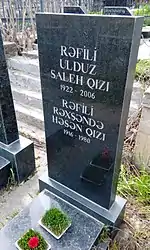Ulduz Rafili-Aliyeva
Ulduz Saleh gizi Rafili-Aliyeva (15 December 1922, Ganja, Goranboy region – 2006, Baku) was an Azerbaijani and Soviet theater director, professor, Honored Art Worker of the Azerbaijan SSR (1964).[1] She was the first Azerbaijani women to become a professional theater director.[2]
Ulduz Rafili-Aliyeva | |
|---|---|
| Born | Ulduz Saleh gizi Rafili December 15, 1922 Ganja, Azerbaijan |
| Died | 2006 (aged 83–84) Baku, Azerbaijan |
| Occupation | theatre director |
| Known for | The first Azerbaijani woman-theatre director |
Early life and education
Ulduz Rafili was born on 15 December 1922 in Ganja.[3] Her father died before she was born and her mother married for the second time.[4] When her mother died in 1935 Rafili started living with her older sister in Moscow.[1]
In 1938, she graduated from Industrial College in Moscow.[4] Later she continued studies in Moscow.[5] Rafili entered the Institute of Railway Engineers where she studied and worked as a station attendant in the Moscow metro and as a machinist on an electric train.[2]
Rafili returned to Baku in 1945. There she entered the faculty of directing of the present University of Culture and Arts, graduating in 1951.[2]
Career

In 1952, Rafili started working as a director in the Young Spectator's Theatre in Baku.[6] During next 20 years she directed over 50 performances on the stage of the theater.[3] Rafili became the first female theater director in Azerbaijan.[6] Many performances staged by Rafili have won All-Union festivals and been awarded diplomas and prizes.[2]
In 1963-1967, Rafili was elected a deputy, engaged in active socio-political activities.[2]
In 1972-1975 Rafili worked as the chief director of the Young Spectator's Theater.[3] In September 1975, Rafili started her pedagogical career at the Department of Opera Training of the Baku Music Academy.[1] During her work at the Music Academy, she directed S. Rakhmaninoff's "Aleko", P. Tchaikovsky's "Iolanta", F. Amirov's "Sevil", Mozart's "The Marriage of Figaro" and others.[1]
Ulduz Rafili died in 2006 in Baku.[4]
Personal life
Rafili was married to Gurban Aliyev who worked in the Ministry of Education of the Azerbajian SSR. They had one son, Hasan Aliyev.[2]
Awards and Honors
In 1964, Rafili was awarded a title of Honored Art Worker of the Azerbaijan SSR.[7]
In 2012, a memorial evening dedicated to the 90th anniversary of Rafili was held at the Young Spectator's Theatre in Baku.[6]
Works
- Second Family (1954)
- Separated roads (1957)
- Crane train (1958)
- Gavroche (1959) by Victor Hugo
- Song of hope (1959)
- Courage (1963)
- Shirinbala collects honey (1965) by Salam Gadirzade
- Rooster (1965)
- Rabbit's birthday (1966) by Khanymana Alibeyli
- The servant of two masters (1968) by Carlo Goldoni
- Last night of last year (1968) by Anar Rzayev
- Gypsy girl (1971) by S.Sani Akhundov
- Ayjan (1973) by Khanymana Alibeyli[1]
References
- "Bir səmanın üç ulduzu - Ulduz Əliyeva, Səkinə Axundzadə və Göyərçin xanım..." Baki-Xeber.com (in Azerbaijani). 2015-09-04. Retrieved 2020-12-17.
- "Sənətdə yaşanan ömür". medeniyyet.az. Retrieved 2020-12-17.
- "Баку почтили память первой азербайджанской женщины - режиссера". АЗЕРТАДЖ. 2012-10-18. Retrieved 2020-12-17.
- "Bir səmanın üç ulduzu - Ulduz Əliyeva, Səkinə Axundzadə və Göyərçin xanım..." www.anl.az. 2015-09-04. Retrieved 2020-12-17.
- "Iyirmi bir yaşında gənç оlarkən". genderi.org (in Azerbaijani). Retrieved 2020-12-17.
- "Ulduz Əliyeva - Rəfilinin 90 illik yubileyi keçiriləcək". azadinform.az. 2012-10-11. Retrieved 2020-12-17.
- "Gənc Tamaşaçılar Teatrı". gtt.az. Retrieved 2020-12-17.